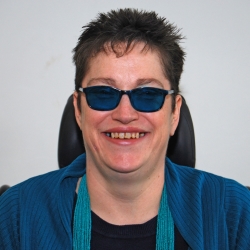 “I didn’t intend to pursue a career in Health Sciences - I was inspired to pursue research immunology by a work placement in my sandwich degree. I was happily pursuing this career when I became disabled”.
“I didn’t intend to pursue a career in Health Sciences - I was inspired to pursue research immunology by a work placement in my sandwich degree. I was happily pursuing this career when I became disabled”.
Katherine’s disability completely changed her career trajectory: “shaking uncontrollably isn’t compatible with the hazards [in laboratories]”. She focussed on computer-based research instead, and set to work reviewing the evidence for allied health therapies in Parkinson’s.
“I found that my disability has been a great advantage, giving me clear insight into the questions and priorities that haven’t traditionally been a priority for research, but that can have real impact in the lives of people with long-term illnesses and disabilities”.
During her work placement in her sandwich degree in Biology, Katherine was supervised by Professor Mark Mannie (East Carolina University, USA). “He let me try things out, fail (I did that a lot), buy weird chemicals and rescued me when my bike broke miles from home one day. And when I was lucky enough to make a small discovery, he let me be first author on the paper. He was always quietly encouraging and never phased by my excitable enthusiasm”.
Another important figure in her career journey was Professor Carl Clarke at the University of Birmingham. “[He] was the first person to employ me after I acquired my disability. I was uncertain of what I could do, shaking fiercely at regular intervals, and he saw past all that to hire me. He never once expressed any doubt that I couldn’t do research because I was disabled”.
Katherine particularly appreciates the ability to work with other academics at UEA: “Treating people will long-term illnesses and disabilities requires a multi-disciplinary team, so it’s great that the School of Health Sciences and Norwich Medical School pretty much covers most of the professions in that team. It’s great working with such a diverse group of experts. My colleagues are all so knowledgeable and about such a wide range of things, and so willing to share their expertise, it’s a real privilege to work with them”.
Katherine’s most memorable career moments include having her research cited 11 times in the first NICE (National Institute for Health and Care Excellence) guidance for Parkinson’s Disease, as well as using her expertise in conjunction with her personal experience of disability to affect change: “I attended a meeting with international pharmaceutical companies looking to improve their engagement with patients in their research. I was able to be there with two hats on – researcher and person with disability – and used that intersection of skills to communicate how they would have to work differently in order to be successful.
She has also influenced change here on UEA campus: “I have been part of the team that turned UEA from a concrete jungle to a pretty accessible campus in just four years. I used my knowledge of a wide variety of long term illnesses and disabilities, as well as my own experience as a wheelchair user, to design access solutions that would have maximum impact”.
For those wishing to enter a career in Health Sciences, Katherine has the following advice: “Do research in an area of healthcare you have a huge passion for. Do it because you cannot conceive being satisfied with the status quo. Accept that a degree of obsession is necessary, but perfectionism never is. Treasure your successes; they have to keep you going through the long slogs of fixed-term contracts, grant rejections and paper revisions. And seize as many opportunities as you can – no matter how strange. Going outside of your comfort zone enables you to learn so much”

:focus(1827x1022:1828x1023))